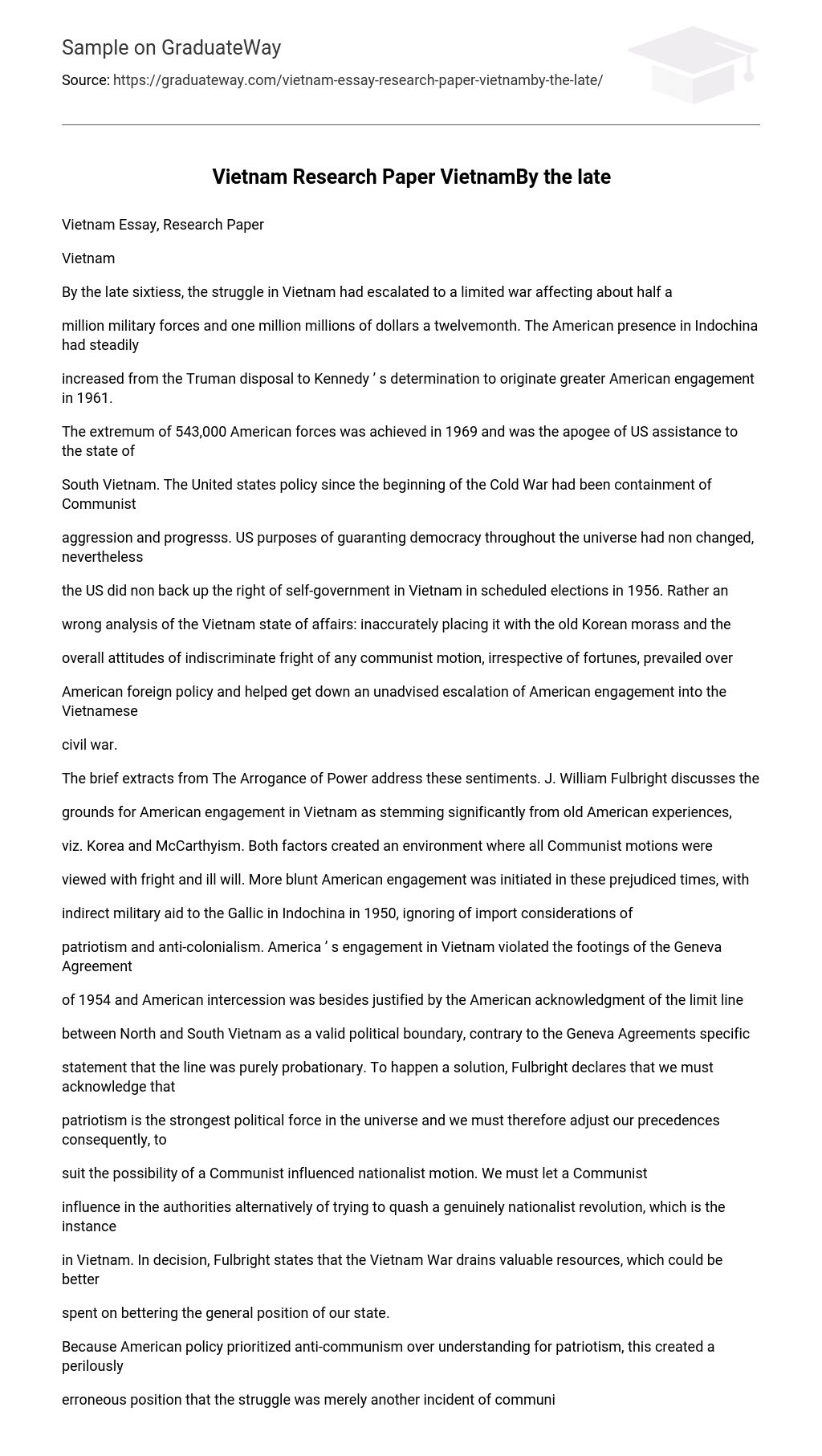By the late sixties, the struggle in Vietnam had escalated to a limited war affecting about half a million military forces and one million millions of dollars a twelvemonth. The American presence in Indochina had steadily increased from the Truman disposal to Kennedy’s determination to originate greater American engagement in 1961. The extremum of 543,000 American forces was achieved in 1969 and was the apogee of US assistance to the state of South Vietnam.
The United States policy since the beginning of the Cold War had been containment of Communist aggression and progress. US purposes of guaranteeing democracy throughout the universe had non changed, nevertheless the US did non back up the right of self-government in Vietnam in the scheduled elections in 1956. Rather a wrong analysis of the Vietnam state of affairs: inaccurately placing it with the old Korean morass and the overall attitudes of indiscriminate fright of any communist motion, irrespective of fortunes, prevailed over American foreign policy and helped get down an unadvised escalation of American engagement in the Vietnamese civil war.
The brief extracts from The Arrogance of Power address these sentiments. J. William Fulbright discusses the grounds for American engagement in Vietnam as stemming significantly from old American experiences, viz. Korea and McCarthyism. Both factors created an environment where all Communist motions were viewed with fright and ill will. More blunt American engagement was initiated at these prejudiced times, with indirect military aid to the Gallic in Indochina in 1950, ignoring import considerations of patriotism and anti-colonialism.
America ’ s engagement in Vietnam violated the footings of the Geneva Agreement of 1954 and American intercession were justified by the American acknowledgment of the limit line between North and South Vietnam as a valid political boundary, contrary to the Geneva Agreements specific statement that the line was purely probated. To happen a solution, Fulbright declares that we must acknowledge that patriotism is the strongest political force in the universe and we must therefore adjust our precedences consequently, to suit the possibility of a Communist influenced nationalist motion. We must let a Communist influence in the authorities alternatively of trying to quash a genuinely nationalist revolution, which is the instance in Vietnam.
Indecision, Fulbright states that the Vietnam War drains valuable resources, which could be better spent on bettering the general position of our state. Because American policy prioritized anti-communism over understanding of patriotism, this created a perilously erroneous position that the struggle was merely another incident of communist aggression that had to be contained like Korea. Furthermore, the US violated the scheduled elections in 1956 by back upon “President Ngo Dinh Diem in his refusal to keep the elections provided for in the Geneva Accords, presumptively because he feared that the Communists would win. . . ” This non merely showed a cardinal job with US policy, but besides the rejection of self-government, which perversely Johnson had stated as one of the grounds for US engagement in Indochina.
Harmonizing to Johnson, the US was in Vietnam, giving lives to back up “ a universe where each person may take its Ain way to change. ” Yet, the US merely violated the Geneva Accords with increased American support and intercession. Although the US military intercession had bolstered Diem ’ s authorities, it did non work out the cardinal job of set upon a feasible and stable state in South Vietnam.
In add-on, US scheme proceeded non merely in ignorance of the local fortunes, but seemingly didn’t even have a clear program to set up a permanent authorities or to efficaciously get the better of the Communists. This was compounded by the fact that the US would non digest an unfavorable result of national elections, peculiarly a Communist triumph, and self-government as a right appeared all but non-existent. The US was in a complex state of affairs with no distinct way to triumph; nevertheless Fulbright suggests that we must acknowledge the cardinal job with our foreign policy. He says that we must accept a authorities elected and supported by the people, even if it is communist because “American involvements are better served by back upon patriotism than by opposing communism.”
Basically, the US needs to rethink their foreign policy in general and explicate a response in Vietnam and elsewhere harmonizing all the factors of the local state of affairs, such as acknowledgment of the power of patriotism and the acknowledgment that non all radical motions are entirely communist oriented. This is non the lone case where US intercession was justified on the footing of supporting freedom against communist motions.
Intervention in the Dominican Republic in April 1965 and every bit late as the American invasion in 1983 of Grenada were merely a few illustrations of American suppression of self-government and support of repressive, undemocratic governments, strikingly similar to US support of Diem and the other governments that followed in South Vietnam. The US needs to earnestly reassess its stance on foreign policy and to halt blowing money on any longer “open-ended” wars.
Bibliography
- Fulbright, J. William, The Arrogance of Power. (1966).
- Johnson, Lyndon B. “ Our Duty in Southeast Asia ” (1965).
- William A. Link et al. , American Epoch: A History of the United States since 1900 Affluence and Anxiety 1940 1992, Volume II (New York: McGraw-Hill, 1993).





